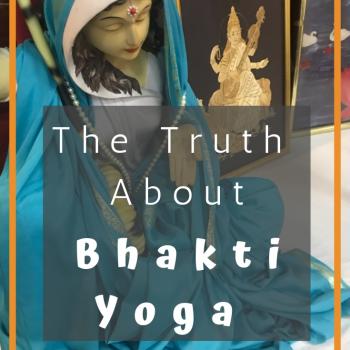Last week Brad and I had the pleasure of visiting an ISKCON center and enjoying some bhajans, chanting, and Gita discussion. It was a wonderful atmosphere and very uplifting to be among fellow spiritual seekers.
It’s not often, I find, that as a Hindu I’m presented with a fundamental philosophical difference between branches. Usually you can just go to any Hindu function, event, or location and know what to expect. There’s a great deal of similarity of practice among various Hindu branches.
But last week we really came face to face with one of the things that makes Vaishnavism different from Advaita.
The Gita discussion led to talking about the ultimate reality beyond this world. For me as an Advaitan that means complete unity with God. Merging with God and becoming one. After all, the word Advaita means non-duality.
For our new friends moksha means joining God but not becoming the same as God.
I will do my best to explain both points of view, though forgive and correct me for any mistakes as only one of these is my belief and it can be challenging to look at it from someone else’s perspective.
They spoke of us as individuals joining God in the reality beyond Maya and being loved by him. But they spoke of us being God’s fingers, or hands, or feet. Not the brain. Only Krishna is the brain. We are part of him but not equal to him.
It is true that once one becomes unified with God there would be no need for bhakti. You wouldn’t worship yourself. When there are not two there is no worshiper and worshipee. So what is the point of bhakti?
I’ve always seen bhakti as being a wonderful step along the way towards enlightenment. Really all yogas to me are stepping stones until we reach the full understanding of our true Selves.
The way it has been explained to me is that we start out seeing God as a distant king. And then we begin to relate to him like a stern father. And then eventually as a loving father. Eventually we relate to him as a dear friend. And then at the end we realize there is no difference between us, our limits and boundaries drop away and we go back to being part of the brain of God.
One of the questions that comes up is how much of our individuality we maintain in that transition. As I’ve talked about recently, I’m not really sure what the core and unchanging part of me is. But whatever is constant and unchanging, that is the part that is God in disguise.
I do believe we are parts in a whole but that we are equal to all the other parts. There are no parts larger or smaller than any other part. It is all God. It is all all of God.
They described it as being as though the world we live in now is the reflection on a clear lake. It has every detail of the real world but it is not as dynamic or full. The real tree is better than the tree reflected in the water. In that way the world beyond this one would look and act almost exactly the same as this one but everything would feel a little more real, I guess?
The example I’ve always liked is that of an ocean. God is the vast ocean and we are tiny droplets. We contain all that is God within us but we are smaller. Yet, and here is where our new friends stopped the metaphor, when those drops are brought back to the ocean they disappear into it and become part of the whole again with no boundaries to distinguish them from any other part of the ocean. It still has all the qualities it had before just with no limitations.
I respect bhakti very much and strive to be better at it myself. However I still think it is a vehicle bringing us along a path that will eventually lead to no longer needing it.














